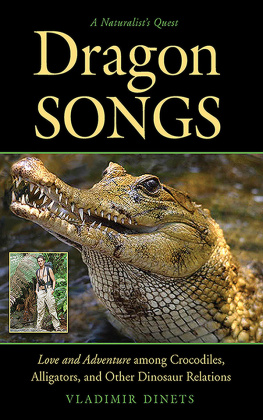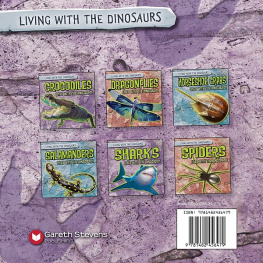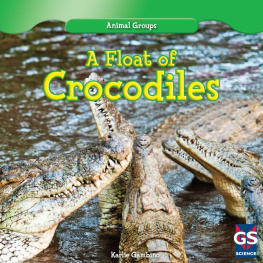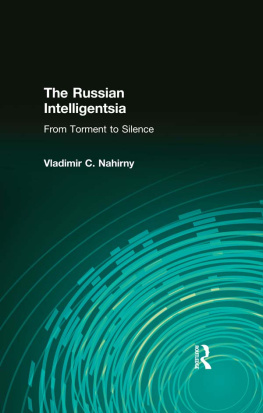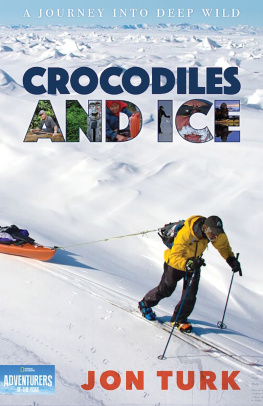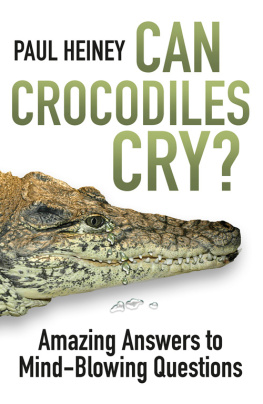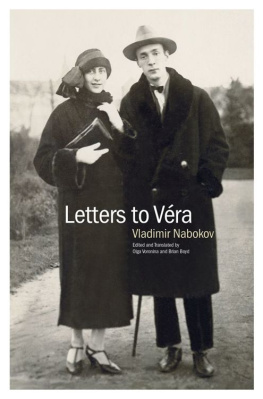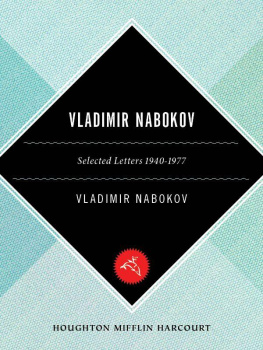Acknowledgments

A journey is best measured in friends rather than miles.
Buddha
MANY PEOPLE HAVE MADE THIS BOOK POSSIBLE, often going beyond what they were asked for, sharing their time, knowledge, experience, transportation, food, water, homes, and campfires, issuing research permits, allowing access to private lands, tribal territories, and research facilities. I can name only a selected few here, but am grateful to all of them.
My thanks to Eisha Alibasha (Ethiopia), Jamal Al-Jawari (Egypt), Chief Asanka (Burundi), Balaqa Ashoba (Ethiopia), Mark Barrett (USA), Ben Bejtel (Namibia), Alex Bernstein (Kenya), Gaurav Bhatnagor (India), Tomas Blohm (Venezuela), Jesekiel Bomba (Uganda), John Brueggen (USA), Jaco Burger (Namibia), Gordon Burghardt (USA), Rick Cameron (Indonesia), Zilca Maria da Silva Campos (Brazil), Mariela Cardenas (Ecuador), Ada Castillo (Peru), Joseph Chadou (DRC), Michael Cherkis (USA), Jennifer Ciaccio (USA), John Clenn (Jamaica), Tommy Collard (Namibia), Steven Conners (USA), Steven Counsel (Mozambique), Paul van Damme (Brazil), Alla Dinets (Russia), Mitch Eaton (USA), Beniamin Eligulashvili (Israel), Tamrat Fahid (Ethiopia), Carla Ferreira (South Africa), Bereket Gebretsadik (Ethiopia), Carl Gerhard (USA), Steven Green (USA), John Hall (USA), Casey Handmer (Australia), Dabeer Hasan (India), Paolo Hatzfeld (Brazil), Steve Irvin (Australia), Tim Isle (USA), Tazz Jacobs (South Africa), Zhao Xin Jiang (China), Alan Karlon (USA), Michael L. Kipkeu (Kenya), Avid Kledzik (USA), Ofer Kobi (Israel), Aaron Kortenhoven (USA), Michael Kosoy (USA), Boris Krasnov (Israel), Pavel Kvartalnov (Russia), Jeronimo Dominguez Laso (Mexico), Mashera Leboma (Tanzania), Pablo Lopez (Ecuador), Raul Marago (Bolivia), Thaddeus McRae (USA), Diana, Edward, and Melanie McTurk (Guyana), Krishna Kumar Mishra (India), Liz von Muggenthaler (USA), Mzwandile Mjadu (South Africa), Pedro Maria Montero (Colombia), Soham Mukherjee (India), Mary N. (Madagascar), Darren Naish (UK), Carmen N. (Bolivia), Franois Ndele (Cameroon), Sunday Nelenge (Namibia), Jeremiah Newman (DRC), James C. Nifong (USA), David Oudjani (France), Maria Oleneva (Mexico), Serverio Pachac (Ecuador), Richard Paper (Madagascar), Asy Patrysheva (Russia), Elena and Victor Pavlov (USA), Se Pedersen (Denmark), Dietmar Posch (South Africa), Pradeep (India), Alfonso Llobet Querejazu (Bolivia), Devis Rachmawan (Indonesia), Eulalie Razoanantenaina (Madagascar), Patty and Allen Register (USA), Wang Renping (China), Sarit Reizin (Kenya), Mark Robinson (South Africa), Damian Rumiz (Brazil), Jorge Sanchez (Guatemala), William Searcy (USA), Genzap Sechen (Ethiopia), Mejangi Sfatau (Uganda), Kabir Sharma (India), Lorraine Shaunnessy (USA), Gopi Shindar (India), Victor M. Siamudaala (Zambia), Kesi Sinclair (USA), Allan Smale (South Africa), Ralf Sommerland (Germany), Jievu Taljard (South Africa), Megan Taplin-Brandfield (South Africa), Peter Taylor (Guyana), Jean-Claude Toutondele-Louzolo (Congo), Asteraye Tsigie-Tesfahunegn (Ethiopia), John Thorbjarnarson (USA), Steve Thorley (Zimbabwe), Richard Tokarz (USA), Kathryn Tosney (USA), Anastasiia Tsvietkova (USA), Ramon Vaquero (Venezuela), Mike Veitch (Indonesia), Eric Villaume (Gabon), Kent Vliet (USA), Roland Vorwerk (USA), Keith Waddington (USA), Nikhil and Romulus Whitaker (India), Christy Wolovich (USA), Xinhuan Wang (China), Utai Youngprapakorn (Thailand), Tesfaye Zewdie (Ethiopia), Benyamin Zuwadi (Indonesia), and Stella !Nomxas (Namibia); also the personnel of the Nad-Lembeh and Papua Diving dive centers (Indonesia), Napo Wildlife Center (Ecuador), and all protected natural areas, publicly or privately owned, where Ive conducted my research.
Crocodiles in Permafrost
Tagarosuchus kulemzini

When you love South, its for its climate, its color, its diversity.
With North, its pure romance.
Valery Yankovsky
TWO YEARS EARLIER, the Danish Ornithological Society had asked me to help organize an expedition to Chukotka, the northeastern tip of Siberia. Its a vast, sparsely populated province, mostly covered with tundra and low mountains, not unlike northern Alaska, which sits across the Bering Sea.
This remotest part of the country has a colorful history even by Russian standards. The warlike Chukchi people invaded it many centuries ago and all but killed off the other tribes. There are still a few Yupik Eskimo villages in the east and a handful of Kereks, Yukaghirs, Lamuts, Koryaks, and Evens in the far south and west.
The first Russians to map this land were Siberian Cossacks, an ethnic group remarkably similar in lifestyle and function to the early Texas Rangers of the Comanche Wars. Despite centuries of conflict, the Russians were unable to fully subjugate the Chukchi, who remained the only tribe free from paying taxes to the czar in the Russian empire. In the late nineteenth century Chukotka had stronger trade ties with the US than with Russia; some old people in coastal villages still speak a bit of English and quietly lament the sad fact that this land wasnt sold to the US together with Alaska.
In the Soviet era, explorers found ore deposits (now most mines are closed due to high operation costs). All shamans were executed, and children were taken to boarding schools, but, unlike many other ethnic groups of Siberia, the Chukchi preserved much of their splendid traditional culture based on reindeer herding and marine mammal hunting. In some villages theyve managed to resist the lure of alcohol. In many others they havent, and the consequences are as bad as it gets. They are supervised by disproportionately abundant government bureaucrats and border guard troops.
A few thousand Russians have hung on in district centers since the times of Soviet colonization of the North, mostly as drivers, seamen, gold miners, and doctors. A few of them fell in love with Chukotka and desperately try to protect it, but others treat the land as an occupied territory, shooting and trapping anything that moves. There are also two small and remote Cossack villages.
Chukotka is largely neglected by Moscow but is not exempt from a constant stream of stupid laws and regulations aimed at facilitating the thorough corruption on which the Russian government depends for survival.
My guests were the first Western bird-watchers to visit Chukotka in ten years. In the mid-1990s, tourists from another European country chartered a helicopter there. Halfway along the route, the pilot landed on the tundra and threatened to leave them there unless they paid him $3,000 per person. I dont know how much they ended up paying, but their story killed all ecotourism in the region for a long time.
Our main goal was to find a tiny bird called the spoon-billed sandpiper. It breeds only on the remotest shores of Siberia and is now on the verge of extinction because of traditional hunting with mist nets in Myanmar, where it winters. At the time of our visit there were about two hundred birds left; now there are far fewer.
Organizing this trip took two years. We had support from official and unofficial authorities and were very lucky with weather and transportation (both are difficult-to-win lotteries in Chukotka). Still, nothing went as planned. Even in the most corrupt parts of Africa youd have to search hard to find such all-encompassing inefficiency. Feudal Soviet bureaucracy is covered by a thin gloss of wild capitalism. To visit a relative in a village fifty miles away, some local fishermen have to fill ten pages of paperwork and pay $3,000 for helicopter tickets. They cant use their boats because independent travel to another district is not allowed in the special border zone, which stretches for hundreds of miles inland from the entire Arctic coast. And even if they buy those tickets, they might have to wait for months for a flight, only to get bumped off it at the last moment because some officials brother-in-law wishes to fly to a remote island to hunt endangered walruses with a machine gun.
Next page
